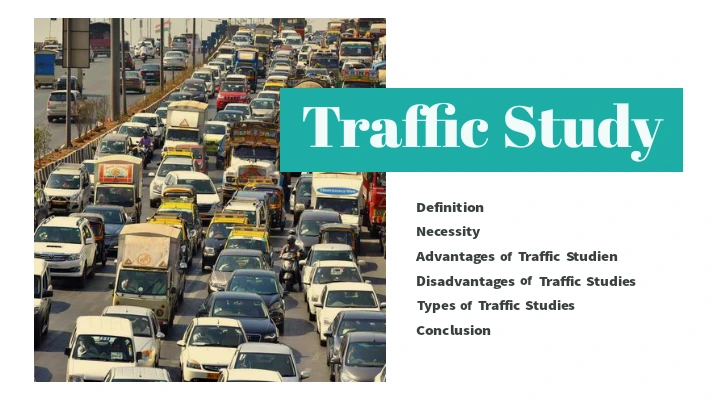Table of Contents
Definition
A traffic studies is a comprehensive analysis conducted to understand existing traffic conditions, forecast future traffic patterns, and propose solutions to enhance traffic flow and safety. It involves the collection of data related to traffic volume, speed, congestion, and other factors, enabling informed decisions in transportation infrastructure and traffic management.
Necessity
Traffic studies are crucial for urban planning, road design, and effective transportation management. They provide insights into the impact of new developments on traffic flow, identifying bottlenecks, safety hazards, and areas of congestion. This information is instrumental in implementing solutions to enhance overall traffic flow and safety.
Advantages of Traffic Studies
- Data-Driven Decisions: Traffic studies offer data-driven insights, empowering authorities to make informed decisions regarding transportation planning and management.
- Improved Safety: By identifying hazardous locations and traffic patterns, traffic studies contribute to improved road safety, reducing the number of accidents.
- Optimized Traffic Flow: Through the analysis of traffic volume and patterns, these studies help optimize traffic flow, reducing congestion and travel times.
- Infrastructure Planning: Traffic studies inform infrastructure planning by identifying areas where new roads, intersections, or traffic signals are needed.
- Environmental Impact: These studies assess the environmental impact of transportation projects, including emissions and noise pollution, enabling the implementation of mitigation measures.
Disadvantages of Traffic Studies
- Cost: Traffic studies can be expensive, requiring specialized equipment and qualified personnel.
- Time-Consuming: Conducting a comprehensive traffic study can be time-consuming, particularly in large urban areas with complex traffic patterns.
- Data Collection Challenges: Collecting accurate and reliable traffic data can be challenging, especially in areas with limited access or high traffic volumes.
- Limited Scope: Traffic studies may focus primarily on traffic flow and safety, potentially overlooking other aspects of transportation planning, such as public transportation.

Types of Traffic Studies
Traffic Volume Study
- Definition: Measures the number of vehicles passing a given point over a specified period.
- Purpose: Understand traffic flow patterns, assess roadway capacity, and forecast future traffic volumes.
- Methods: Automatic traffic counters, manual counts, and video recording.
Speed Study
- Definition: Measures vehicle speed on a roadway to assess compliance with speed limits and identify areas of speeding.
- Purpose: Improve road safety, assess the need for speed limit adjustments, and design effective speed control measures.
- Methods: Radar guns, speed cameras, and GPS technology.
Intersection Study
- Definition: Analyzes traffic flow and safety at intersections to improve efficiency and safety.
- Purpose: Assess intersection performance, identify congestion points, and propose improvements.
- Methods: Video recording, traffic counts, and observation.
Parking Study
- Definition: Assesses the availability and utilization of parking spaces to improve parking management.
- Purpose: Identify parking demand, assess parking facilities, and propose solutions to address shortages.
- Methods: Surveys, observations, and parking counts.
Pedestrian and Bicycle Study
- Definition: Analyzes the movement of pedestrians and cyclists to improve safety and accessibility.
- Purpose: Assess pedestrian and cyclist volumes, identify barriers, and propose infrastructure improvements.
- Methods: Surveys, observations, and video recording.
Conclusion
Traffic studies play a crucial role in urban planning and transportation management by providing valuable insights into traffic patterns, safety hazards, and infrastructure needs. Despite certain limitations and challenges, the benefits of conducting traffic studies far outweigh the drawbacks, making them an essential tool for improving traffic flow, safety, and sustainability.
Structural Audit – Objectives | Bye-Laws | Importance
Top 7 Cricket Stadium in India | Construction Details

Hello! I’m Vaishnavi, a civil engineer who enjoys sharing how we design and build structures. My blog makes understanding engineering easy and interesting for everyone!

1 thought on “Traffic Studies Types of traffic Necessity Advantages”